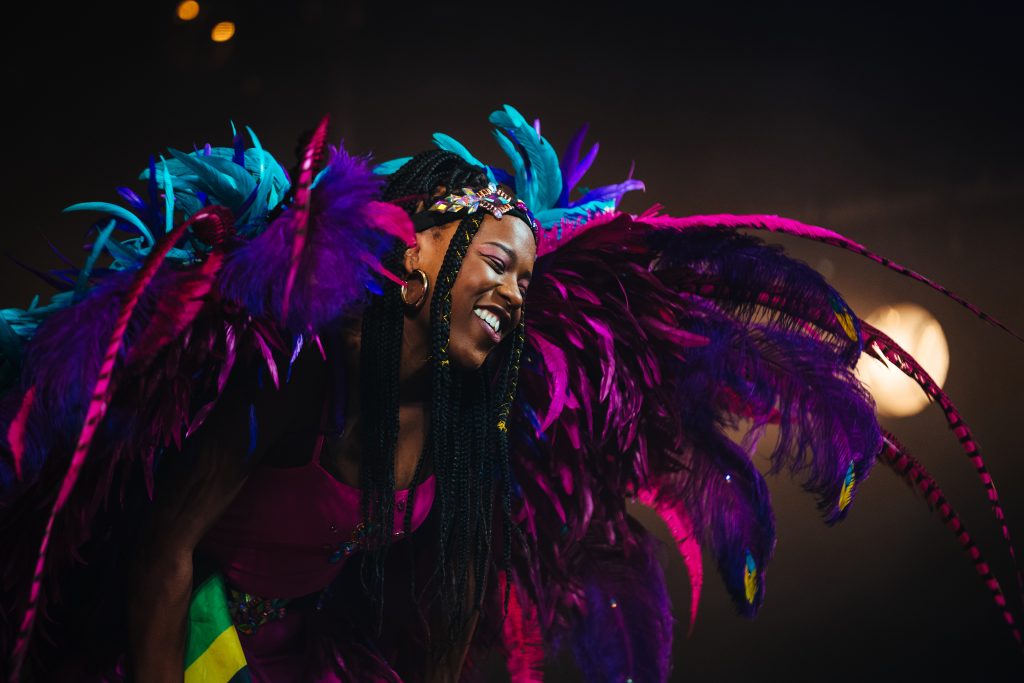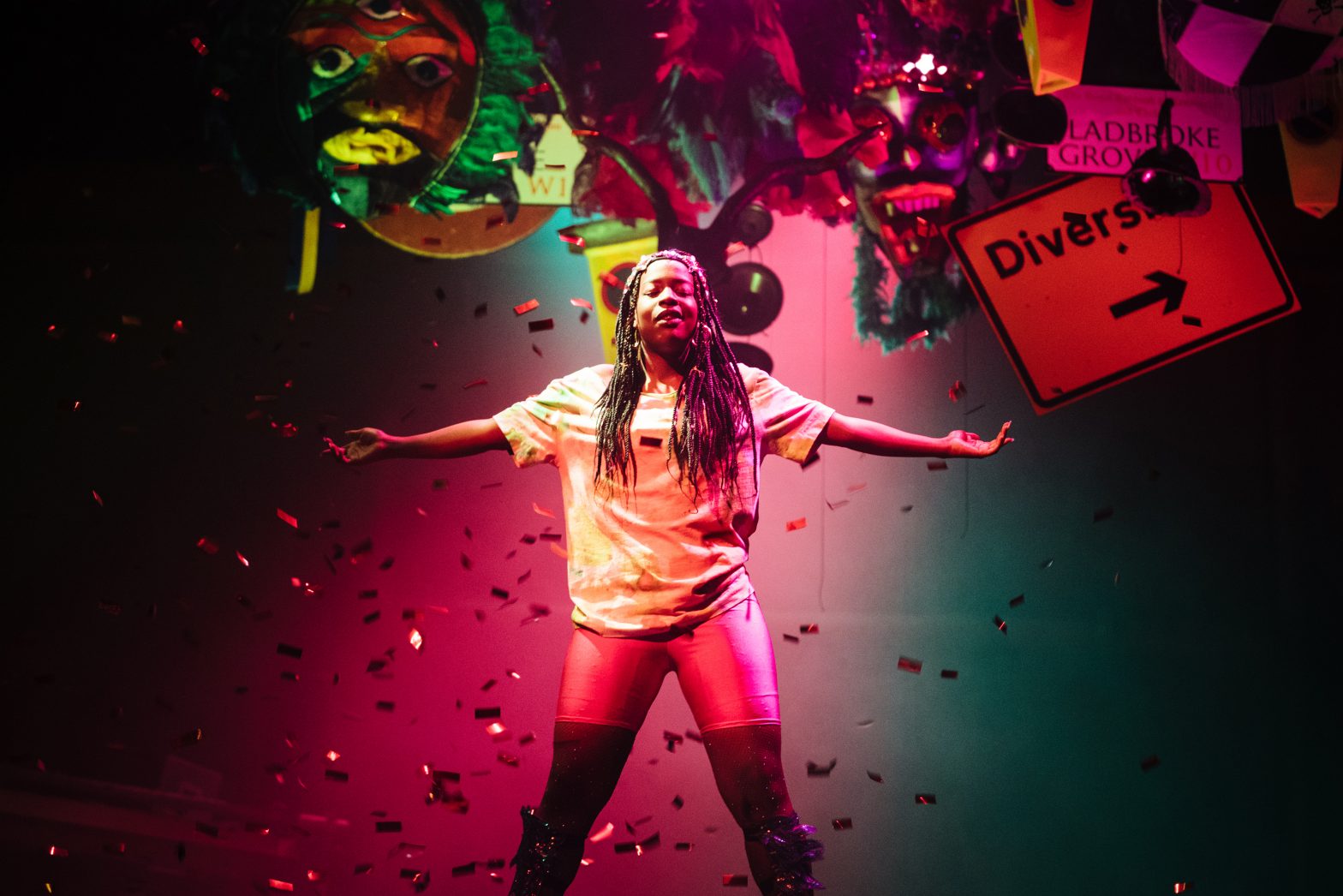This article is part of a mini-season celebrating the return of Black femme theatre.
TW: references to instances of femicide
When I spoke to Yasmin Joseph in late June, we spent the first five minutes talking about Camden. It turns out our childhood neighbourhoods were right next to each other. We went to the same park, same shopping centre, were in the same catchment area for secondary school. I didn’t know Yasmin growing up, but the worlds of her plays are so familiar. In her debut play J’Ouvert, first performed at Theatre503 in 2019, I saw the girls I went to school with, the pensioners who lived down the block. But most affecting for me was Yasmin’s perception of community. It’s one that emphasises collective responsibility and collective power, that reminds me of what it means to be local, looked-out for, valued as part of a whole.
The play follows Nadine at Notting Hill Carnival, on a mission to win “Face of the Fete” for an all-expenses-paid trip to St Lucia. “I’d take you with me,” she says to her best friend Jade, whose journey through Carnival shows her discovering her political voice. At its center, J’Ouvert is a story of friendship and, in many ways, an examination of what it means to be cared for and held. When I ask Yasmin about the making of the show, it’s clear these are considerations she makes offstage as well. Most of Yasmin’s plays thus far have been directed by Rebekah Murrell; “we’ve got an established way of working with each other,” she tells me, emphasising that finding the right collaborators can affect the creative potential of a show.
“There’s a world where this play wouldn’t have existed if, at the foundation of its creation, there wasn’t somebody like Rebekah alongside who would say: ‘go and be with your family today, I’ve got this. I’m holding it, I’m holding you, I’m holding this play,’” she says. “I almost feel a bit spoiled now.”
For Yasmin, there are now criteria for her collaborators: “they need to be interested in finding the most humane and soulful, deep, imaginative, funny ways of taking a crack at those questions of our existence.” It is also important for her to be working with the people that she genuinely believes are shaping the industry right now, such as director Milli Bhatia.
“I’m working with [Bhatia] on a project and I never realized that theatre could be that fun. Like it was just insane, but also just deeply imaginative in a way that pushes me,” she explains. “I feel renewed by that. So now I know that that exists, I’m less inclined to take less.”

Yasmin’s journey toward playwriting wasn’t a straight shot. In 2015 she moved to New York for a year to work at New York Theater Workshop as their Engagement Intern, “doing audience outreach, all of that jazz. I also got to be a teaching assistant on a playwriting course.” She developed a process of working in and around lots of different areas of theatre, but not actually writing. While in the city she went to the Labor Day Parade in Crown Heights – in many ways Brooklyn’s equivalent to Notting Hill Carnival.
“I went and I had a great time, like, okay, wicked, I’ve found my tribe. And then a year later when I got home, everyone was telling me, ‘you need to be more careful, you shouldn’t have gone.’ I was like, what? How could I not go?”
I moved to Brooklyn – to Crown Heights – the year Yasmin left. I arrived with my overstuffed suitcase on the day of the parade, and similarly found myself following the music, walking through the streets and thinking about Carnival. The next day, there was news of a shooting a few blocks from where I was living.
“That year when I came home to London,” Yasmin recalls, “I learned of a woman called Tiarah Poyau, who’d been shot and killed for declining the advances of a man [at the Labor Day Parade]. Hearing that did something to me; it genuinely rocked my core. This girl was just living her life.”
I remember there being so little information on the incident. Similarly, Yasmin remembers furiously digging for any details online, thinking about comparable exchanges that she’d had at Carnival, experiences “that Black women have generally had in the spaces that we pioneer and we uphold.”
Help us publish more interviews like this. Become a Skin Deep member.
Then she learned about Asami Nagakiya, who’d been found strangled in her costume at Jouvert in Port of Spain, Trinidad. Yasmin tells me that Tim Key, the mayor of Port of Spain at the time, released a statement saying that perhaps if she wasn’t dressed that way, it wouldn’t have happened to her.
This series of events – moving away from home, finding home, and later deeping some of the realities of the spaces we hold close – compounded into what Yasmin called “an angry knot.” She returned home with a new perspective and desire to stake her claim and renew her joy in Carnival, “but this also meant acknowledging how I’d been forever changed by all of the things that this space is now loaded with for me.”

When I saw J’Ouvert at Theatre503 in 2019, I remember feeling haunted pretty much throughout, but not entirely sure what I was haunted by. On the one hand, there was the spectre of Grenfell. Though Yasmin started writing the play before the fire in April 2017, there was no way to truthfully look at that part of London – at the government’s enduring commitment to murderous austerity – without acknowledging that Carnival takes place in its shadow. On the other hand, there’s the spectre of history, of the foundations of Notting Hill Carnival and the women like Claudia Jones, radical communist and activist, who founded it. At the heart of J’Ouvert – not just the play but the fête itself, in all its iterations across the Caribbean diaspora – are the presence of spirits. They are there with us.
“She has to be!” Yasmin exclaims about Claudia Jones after I mention this theory of metaphysical presence. “She poured so much of herself into her politics, and experienced such immense costs as a result of her vision.”
I ask Yasmin how her ideas on life, death, and hauntings have shifted since the play was first up in 2019, especially in light of our collective realities in the time since. It’s a pertinent question for her, after recently experiencing a major loss in her family. She tells me about the difficulties of mourning when so many Black funerary practices are collective, how digitized spaces can never take the place of the singing, crying and dancing we do together. She also says that as Black people, considering all we have experienced over time, we owe it to ourselves to creatively imagine the worlds that we live in, and the spaces that we’ve been confined to.
“Every year when Carnival happens, it feels like a calling,” she says. “And I think that the only way to deal with our reality is to think about the various realms of existence. And to think about actually – for me, particularly at this moment – how blurred the lines are between each of those layers.”
For most of my conversation with Yasmin I’ve had goosebumps, and by the end of it I can’t hold back the tears. It is uncanny, the ways our lives have moved separately alongside each other, the ways our plays explore similar themes in very different ways. I feel so proud of Yasmin and so grateful to be coming up in an industry where I can look toward her, and I tell her this. I ask her what lessons she will take forward as she continues to produce work. “Come in with the most robust understanding of who you are,” she says. “Know the part of you that’s immovable. It’s about bossing up a little bit.” When I ask her what is immovable, what are the considerations at the centre of her work, we cannot help but invoke the spirit of Claudia Jones once more.
“It’s really about recognising the Black women that pioneered and didn’t necessarily get to see the fruits of their labour in its entirety. Thinking about the joy I get, and all the power I feel, in being able to replicate even a small version of that labour,” she explains. “And to do so with Black women I respect, and care about, and believe in, for Black women I respect, and care about, and believe in. That feeling? It’s the most loving, the best feeling I could have coming out of one of the toughest years of my life.”
Stay in touch. Subscribe to Skin Deep’s monthly newsletter.
